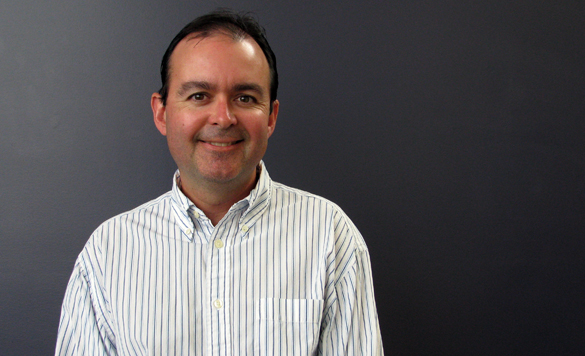Despite a research specialty on multitasking, Dr. L. Mark Carrier tends to keep his focus on one common goal: the success of his students and faculty. As a third-time chair of the psychology department, he works to give his colleagues the support that he has received in being nominating and winning the California State University, Dominguez Hills 2011 Presidential Outstanding Professor Award.

“I try to stay faculty-centered,” he says. “I support them and give them what they want because I know that will ensure student and departmental success.”
Carrier says that he uses an interactive approach with his students as well, giving them a chance to share with him the best ways for them to learn.
“From listening to them, [my students] usually say I’m easily accessible and down-to-earth,” he says. “Often in the beginning of the semester, I give them a chance to give input into the structure of the course, and I’ll make changes to the syllabus based on what they say. I figure they know better than I do about how they learn.”
Examining how young people learn is part of Carrier’s research as a co-founder of the George Marsh Applied Cognition Laboratory at CSU Dominguez Hills, which he oversees with professors and colleagues Dr. Nancy Cheever and Dr. Larry Rosen. He says that the space has the potential of drawing scholars from around the world to CSU Dominguez Hills as guest lecturers and for conferences.
Carrier looks forward to the lab’s new study on multitasking, which builds on the research that he did with Cheever, Rosen, and their students in their book, “Rewired: Understanding the iGeneration and the Way They Learn.” One of their goals is to prove or disprove the theory that the “Net Generation” – people born since 1980 – is a group of “’super multitaskers,’ better than any humans who existed before,” Carrier says. “There are no data to reject or support that, it’s all hearsay and speculation. So we’ve collected a few data sets and we’re in the middle of analyzing that to verify it.”
Having earned his doctorate in this particular field, Carrier says that all the known research says that multitasking has less to do with age and technology and more with the brain’s capacity as determined through evolution.
“Psychologists have known since the 1960s that multitasking is hard for people,” he says. “Most psychologists are very skeptical about the claims of a whole new generation coming along that is going to be good at it… it’s not going to change in just a few decades.”
Carrier and his colleagues have done a recent study on the kinds of activities that are multitasked. He says that regardless of a subject’s age, there was a consensus on what tasks were made more difficult by doing them all at once.
“Driving and talking on the phone is bad for you, but it’s also hard to do,” he says. “Other things are easier, [like] listening to music and doing something else at the same time. The basic limitations of the brain are pretty much the same, no matter how old you are, and even with these younger people who are multitasking like crazy.”
Carrier has been a member of the psychology faculty since 1998. A tenured professor, he is currently serving for a third term as chair of the psychology department. From 1999 to 2009, he also served as a co-team leader for the American Psychological Association/National Institute of General Medical Sciences (APA/NIGMS) Minority Student Training Program in biomedical sciences.
Carrier earned his bachelor’s degree in cognitive science and graduated cum laude from the University of California, San Diego, where he also achieved his master’s and doctorate degrees in experimental psychology. As a graduate student, he served as a teaching and research assistant in the psychology department at UCSD. His research interests include human memory, applied cognitive psychology, and the psychology of technology.
The author of numerous articles and papers, Carrier has contributed to the Journal of Cross-Cultural and Interlanguage Communication, the Journal of Applied Developmental Psychology, and the On-line Journal for Teaching and Learning in the CSU. He also co-authored a chapter on “Structures, Processes, and the Flow of Information” for “Memory: Handbook of Perception and Cognition.” He is currently at work on a second book with Cheever and Rosen titled, “iDisorder: How the Internet is Making You Crazy and How You Can Stop It,” to be published in 2012. Dr. Carrier is an ad hoc reviewer for the American Journal of Psychology and a member of the American Psychological Association, Psi Chi, and the Western Psychological Association.
When asked what his most exciting research discovery was, Carrier says that “the most exciting one is yet to come.” Although he started out as a computer engineering major as an undergraduate, he says that he was fascinated in his first psychology course by his professor who described the scientific approach to learning about human behavior.
“I always thought that you couldn’t get straight answers because human behavior is so subjective,” recalls Carrier. “But then I learned that you could apply science to human behavior and emotions – and get answers.”